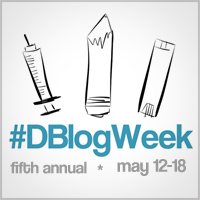This is my third JDRF Government day and it was just as special and as important as the first two years.
The format was the same as the previous years. We had two days of learning about current JDRF issues like the
Promise to Remember Me Campaign and the
Special Diabetes Program. This was again followed by two days on Capital Hill meeting with our legislators and education them about diabetes issues and the importance of funding for its research.

There were a few new things this year. Jill, our GLT, is spending some time in China and was replaced with Paula. She will be our new Government Relations leader for Ohio, Michigan, Indiana, and Kentucky.

We started the weekend with a research update. I liked that the trend seem to focusing more on biological than Artificial Pancreas research. That has always been my preference. One interesting question on the artificial pancreas did make me feel a little better. Someone asked Jeffrey Brewer about how an inconsistent continuous glucose monitor could be trusted to run an insulin pump. The answer was first an acknowledgement of this issue and explaining how the monitor would be more focussed on the direction of the blood sugar swing, more than its actual value. I was intrigued and relieved by that answer.
We had a nice dinner out on Sunday evening with our group. We have a nice and varied group with some Type 1s and some Moms of.

Our meetings with the legislators were actually with their aides. The aides were for the most part very friendly. Senator Brown's aide was a little short with us and asked some questions on the involvement of the Special Diabetes Program and the "Doc Fix" that were a little beyond our understanding. Luckily one of the Government Relations staff was with us to field her questions. Time will tell whether this pairing of the SDP and the Doc fix was a good plan. The other Aides were friendly, but not very knowledgeable of Type 1 and its issues. I did my best to change that and to explain how close we are to getting some real relief.
 |
| Encaptra delivery system |
Monday evening we all enjoyed an update from our CEO and leader, Jeffrey Brewer. He is a very good speaker and always inspires confidence in our organization and its goals. This time was now exception. He began with a long description of what it is like to get a diagnoses of Type 1 diabetes. I think we were all taken aback by its insightful and heartbreakingly real description. Even with all of our combined experience, it was a shocking story. I'm working on getting
an excerpt.
The most exciting part of the whole weekend was having Jeffrey Brewer tell us about and then show us what the newest research development was all about. The
JDRF is working with Viacyte to make an islet cell delivery system. This device will be loaded with islet cells and inserted under the skin in the upper back. It contains pores that allow the transfer of glucose and insulin, but not antibodies. So, insulin will be released, AS NEEDED, in response to the circulating glucose levels. But, no immunosuppression will be necessary because it will be protected by the sheet's membrane.
Clinical trials might begin as early as this calendar year.
This approach is also underway in a few other sites. The DRI is working on their version called the Bio Hub. In Edmonton, Canada, Sernova is working on their Islet Cell Pouch. They are already in clinical trials. There are two people on the Islet Cell Recipient Facebook page who are on the list and waiting for this procedure. In California, the Hanuman Medical Foundation is working on the Islet Sheet. And in New Zealand, Living Cell Technologies is working on encapsulated pig islet cells with its Diabecell. Diabecell is different from the others in that it uses a microencapsulation technique. The individual islet cells are encapsulated. The others use macroencapsulation by using some kind of container to house and encapsulate a large amount of islets.

I met Lorraine while waiting for the bus to take us back to the hotel. We talked for awhile and it turns out she knows Dr. Hering. She sent him this picture of the two of us. He sent back a nice reply. Needless to say, it really made my day!
I had some time to explore between my meetings and went to the Botanical Gardens. I just loved this synchronized fountain. These colorful flowers make me long for Spring.
I'm doing alright. I had a PRA test drawn last week. It will tell how many antibodies I have been exposed to.
My insulin needs and blood sugars are about the same as pre-transplant. I'm using about 17-18 units of insulin along with Symlin at each meal.
 I've been finding myself looking backward for awhile now. Its been hard to accept that my islets are really gone. I know that looking back is not a very positive thing to do, so I'm going to start looking forward now. But, I thought I'd post this first. These are in no particular order.
I've been finding myself looking backward for awhile now. Its been hard to accept that my islets are really gone. I know that looking back is not a very positive thing to do, so I'm going to start looking forward now. But, I thought I'd post this first. These are in no particular order.











